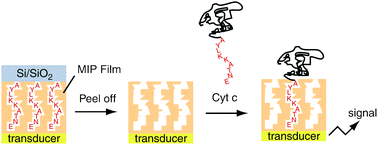The rational development of molecularly imprinted polymer-based sensors for protein detection
Abstract
The detection of specific

* Corresponding authors
a
Cranfield Health, Cranfield University, Cranfield, Bedfordshire, UK
E-mail:
m.whitcombe@cranfield.ac.uk
Fax: +44 1234 758380
Tel: +44 1234 758329
b National Physical Laboratory, Hampton Road, Teddington, UK
The detection of specific

 Please wait while we load your content...
Something went wrong. Try again?
Please wait while we load your content...
Something went wrong. Try again?
M. J. Whitcombe, I. Chianella, L. Larcombe, S. A. Piletsky, J. Noble, R. Porter and A. Horgan, Chem. Soc. Rev., 2011, 40, 1547 DOI: 10.1039/C0CS00049C
To request permission to reproduce material from this article, please go to the Copyright Clearance Center request page.
If you are an author contributing to an RSC publication, you do not need to request permission provided correct acknowledgement is given.
If you are the author of this article, you do not need to request permission to reproduce figures and diagrams provided correct acknowledgement is given. If you want to reproduce the whole article in a third-party publication (excluding your thesis/dissertation for which permission is not required) please go to the Copyright Clearance Center request page.
Read more about how to correctly acknowledge RSC content.
 Fetching data from CrossRef.
Fetching data from CrossRef.
This may take some time to load.
Loading related content
